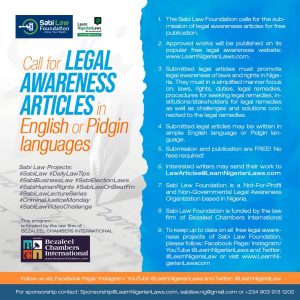Nigerian Customs Cannot Charge Import Duties On A Personal Luggage. Daily Law Tips (Tip 577) by Onyekachi Umah, Esq., LLM. ACIArb(UK)
It was cold and dark at the Nnamdi Azikiwe International Airport, Abuja, on 21 November 2017, while I waited in the dirty car park with no functional street light. I went to welcome a friend but he was not allowed exit by officers of Nigerian Custom Service, two hours after being searched. The Custom Officers were demanding for import duties from him, for having a packed brand new Patek Philippe wristwatch in his personal luggage (hand-carry). Without any proof, the officers concluded that the wristwatch was for sale and they demanded to be paid an outrageous sum in foreign currency. They ceased my friend’s international passport and wallet until he borrowed a phone with Nigerian mobile network and called for my assistance.
Nigerian Custom Service is established for and charged with the duty of controlling and managing the administration of the customs and excise laws and collection of the revenues of customs and excise and accounting for them. Officers of Nigerian Customs Service have all the powers, authorities and privileges given by law to Police Officers in Nigeria. So, just like Police Officers, Customs Officers can arrest with or without warrant of arrest as well as detain suspects.
Among other things, Customs Officers regulate boarding and disembarking from ships, aircrafts or vehicles in customs-controlled areas as well as leaving of airports, customs posts and any other customs controlled area by any person. Any person that enters or is about to enter into Nigeria is expected to declare and present to Customs officers, all goods to be imported or exported for a proper examination and such person must answer all questions put to him. Every person bringing goods into Nigeria, must present necessary forms and documents to Customs Officers for such imported goods. However, this does not apply to passengers’ accompanied baggage (including “hand-carry/cabin-carry), unless a Custom Officer in a given case requests for such. Specifically, passengers’ accompanied baggage include passengers’ personal and household accompanying luggage.
The Federal High Court siting in Abuja, in May 2020, in the case of Mr. Kehinde Ogunwumiju (SAN) v. Nigerian Customs Service Board & Anor in Suit No: FHC/ABJ/CS/1113/2019, held that; “… the only instance in which officers of the Nigeria Customs Service can lawfully demand and collect import duty from anyone in respect of goods/personal effects found in their baggage is where it can be established that the said goods/personal effects are meant for sale, barter or exchange.”
Hence, it is clear that Customs Officers have no powers to demand for any payment (import duties or bribe) for passengers’ personal and household accompanying luggage, unless there is proof that the items in the passenger’s luggage are for sale. The proof must be established ahead of a demand for payment of import duties and not just based on mere speculation.
There is no law that expects expensive and exotic personal/household items in personal baggage to be charged import duties. People don’t need to remove price tags and packets of their personal items just to prove items are not for sale and thereby avoid being charged import duties. The high number of a personal item in a baggage may not mean that such item is for sale, it could be gift for a large family. In the above case, the court awarded damages of Five Million Naira (N5, 000.00) against Nigerian Customs for charging import duty on a personal luggage (laptop bag) and also ordered the refund of the illegally obtained import duty of N156, 955. 20k (One Hundred and Fifty-Six Thousand, Nine Hundred and Fifty-Five Naira, Twenty Kobo). This is the law and until it is changed by the National Assembly, it remains the law.
References:
1. Sections 4(1), 8, 27, 71, 72, 73 and 75 of the Customs and Excise Management Act (Amendment Act), 2003.
2. Section 8 and Item 10, Second Schedule to the Customs, Excise Tariff, etc. (Consolidation) Act, 1995
3. Sections 24, 25 and 29 of the Police Act.
4. The Federal High Court’s judgment (on goods exempted from import duties) in the case of Mr. Kehinde Ogunwumiju (SAN) v. Nigerian Customs Service Board & Anor (Suit No: FHC/ABJ/CS/1113/2019)
5. Peter Uzoho, ‘Court Bars Collection of Import Duties on Non-commercial Goods, Others’ (ThisDay, 14 May 2020) <https://www.thisdaylive.com/index.php/2020/05/14/court-bars-collection-of-import-duties-on-non-commercial-goods-others/> accessed 16 May 2020
6. Chioma Unini, ‘Court Bars Nigeria Customs Service From Collecting Duty On Goods/Personal Effect On Passenger’s Baggage’ (TheNigerianLawyer, 13 May 2020) <https://thenigerialawyer.com/court-bars-nigeria-customs-service-from-collecting-duty-on-goods-personal-effect-on-passengers-baggage/> accessed 16 May 2020
Picture Credit; Oa2Law.com
Sabi Law Projects:
#SabiLaw
#DailyLawTips
#SabiBusinessLaw
#SabiElectionLaws
#SabiHumanRights
#SabiLawOnBeatFm
#SabiLawLectureSeries
#CriminalJusticeMonday
#SabiLawVideoChallenge
Feel free to reach the author, ask questions or make inquiries on this topic or any other legal issues via onyekachi.umah@gmail.com or +2348037665878.
****************************************************************************************
This work is published under the free legal awareness project of Sabi Law Foundation (www.SabiLaw.org) funded by the law firm of Bezaleel Chambers International (www.BezaleelChambers.com). The writer was not paid or charged any publishing fee. You too can support the legal awareness projects and programs of Sabi Law Foundation by donating to us. Donate here and get our unique appreciation certificate or memento.
DISCLAIMER:
This publication is not a piece of legal advice. The opinion expressed in this publication is that of the author(s) and not necessarily the opinion of our organisation, staff and partners.
PROJECTS:
🛒 Take short courses, get samples/precedents and learn your rights at www.SabiLaw.org
🎯 Publish your legal articles for FREE by sending to: eve@sabilaw.org
🎁 Receive our free Daily Law Tips & other publications via our website and social media accounts or join our free whatsapp group: Daily Law Tips Group 6
KEEP IN TOUCH:
Get updates on all the free legal awareness projects of Sabi Law (#SabiLaw) and its partners, via:
YouTube: SabiLaw
Twitter: @Sabi_Law
Facebook page: SabiLaw
Instagram: @SabiLaw.org_
WhatsApp Group: Free Daily Law Tips Group 6
Telegram Group: Free Daily Law Tips Group
Facebook group: SabiLaw
Email: lisa@sabilaw.org
Website: www.SabiLaw.org
ABOUT US & OUR PARTNERS:
This publication is the initiative of the Sabi Law Foundation (www.SabiLaw.org) funded by the law firm of Bezaleel Chambers International (www.BezaleelChambers.com). Sabi Law Foundation is a Not-For-Profit and Non-Governmental Legal Awareness Organization based in Nigeria. It is the first of its kind and has been promoting free legal awareness since 2010.
DONATION & SPONSORSHIP:
As a registered not-for-profit and non-governmental organisation, Sabi Law Foundation relies on donations and sponsorships to promote free legal awareness across Nigeria and the world. With a vast followership across the globe, your donations will assist us to increase legal awareness, improve access to justice, reduce common legal disputes and crimes in Nigeria. Make your donations to us here or contact us for sponsorship and partnership, via: lisa@SabiLaw.org or +234 903 913 1200.
**********************************************************************************























































One Response